Planet of the Apes (1968)
Directed by: Franklin J. Schaffner
Written by: John T. Kelley, Michael Wilson, Pierre Boulle, Rod Serling
Starring: Charlton Heston, Kim Hunter, Maurice Evans, Roddy McDowall
USA
AVAILABLE ON BLU-RAY, DVD AND DIGITAL
RUNNING TIME: 112 mins
REVIEWED BY: Dr Lenera
MAJOR SPOILERS!
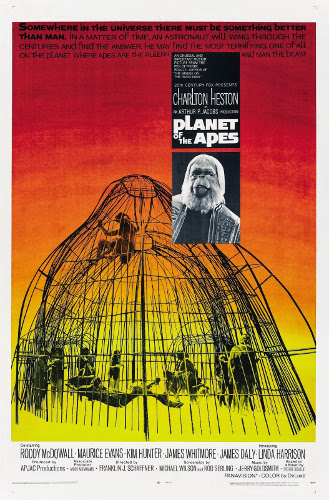
Astronauts George Taylor, Landon and Dodge come out of deep hibernation to find that their spaceship is crashing onto the surface of a planet, killing the one female member of the crew. Initially this world seems uninhabited, but eventually they discover that it’s ruled by intelligent talking apes who cruelly lord it over the primitive, mute humans. During a brutal ape raid on a human tribe, Dodge is killed and George shot in the throat so that he’s silent and cannot communicate with the apes. He and Landon are captured and taken to an ape city where there’s tension about what to do with these curiously clever humans….
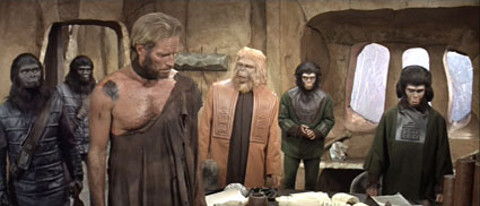
So I’ve decided to go through another series, and opted for science fiction as opposed to horror. I’ve been a big fan of the whole Planet Of The Apes concept for several decades; as a kid it really ignited my imagination. I even used to own some novels which were stories that took place in the Ape Universe even if they didn’t contain any familiar characters. My heart sank when the reboot trilogy commenced, but I was proved wrong; here were films I enjoyed just as much. As for the 2001 remake – I try to forget that one, but hopefully watching it with more mature eyes will reveal some qualities. We’ll see. This original 1968 film still having the status of a bona fide classic is something which I doubt is disputed by many veteran movie fans who love the old as well as the new, but would it impress many young viewers today with its people wearing ape suits, frequent dialogue scenes which foreground the allegorical aspects, and lack of a big action climax? I like to think that it would if they remembered when it was made, though it’s doubtful that its shocking twist which truly stunned 1968 moviegoers and indeed me when I first saw it on TV would even work, because the reboot trilogy is set on earth all the way through and therefore somebody who goes from those films to this one may work out that we’re also on earth quite early on [in terms of narrative chronology that’s actually quite a good thing to do even though I’m covering the films in the order in which they were made]. And let’s not forget that old DVD box set which had the bleeding Statue of Liberty on the cover, something that almost caused me to cry out,“You maniacs, Goddamn you all to hell” Charlton Heston style. It was made in the same year as 2001: A Space Odyssey and you could almost say that big budget screen science fiction grew up with these two, but Planet Of The Apes had one over on 2001; it was fun! In fact it almost perfectly got the balance right between the intellectual and the adventurous, between brain food and entertainment.
It was based on a novel of the same title by Pierre Boulle which producer Arthur P. Jacobs bought the rights for even before its publication in 1963. He couldn’t get any studio interested until his success with What a Way to Go! for 20th Century Fox convinced Fox vice-president Richard D. Zanuck to green light it. Blake Edwards was to direct, then J. Lee Thompson, while Twilight Zone creator Rod Serling wrote the first script and created the twist ending which was different from the one in the book, though it was rejected, primarily because it kept the ape civilisation really technically advanced, something that would have cost a great deal. Michael Wilson’s rewrite kept the story but changed the dialogue and made the ape society more primitive as a way of reducing costs. To totally convince Fox that this could be made, test footage involving John Chambers’ makeup was shot with Heston, Edward G. Robinson as Zaius, James Brolin as Cornelius and Linda Harrison as Zira. Harrison went on to play Nova [over Ursula Andress and Raquel Welch] while the elderly Robinson was properly cast as Zaius but backed out due to the heavy makeup and long sessions required to apply it. The main shooting locations were around the Colorado River in Arizona, and a stretch of California seacoast between Malibu and Oxnard with cliffs that towered 130 feet above the shore. Reaching the beach on foot was virtually impossible, so cast, crew, film equipment, and even horses had to be lowered in by helicopter. The cast members playing apes became so affected by their roles and wardrobe that, when not shooting, they automatically segregated themselves with the species they were portraying. Heston had flu throughout, but it was felt that his hoarse voice added something rather than there be waiting for him to recover. It was a big critical and commercial success, and the film became even more popular from TV showings in the ‘70s.
The voice of George sending a message to earth opens the film, and I never realised before now that the ending is almost foreshadowed with lines like, “You who are reading me now, are a different breed, hopefully a better one”. I also realised this time around the brilliant irony of George, who of course soon becomes the centre of attention because he’s a talking, intelligent human, being a sarcastic, weary misanthrope who wanted to get away from earth and who doesn’t even seem bothered when his ship crashes [shown from the POV of the ship!] and maroons him and two others while the sole female in the expedition perishes, the first surprise in a story full of them, letting you know that, for 1968 at least, this wasn’t your typical cinematic visit to another planet. The three paddle their dingy down a river, and walk across mountainous and desert terrain, and director Franklin J. Schaffner and cinematographer Leon Shamroy makes such simple sequences seem very ominous because of the number of times we see the humans from a great distance, dwarfed by their surroundings, providing a real feeling of danger. The native humans are introduced gradually, peering from above, stealing the clothes of the astronauts – until a whole tribe is seen, eating vegetables, many of them up trees, behaving not unlike apes. It’s rather calm, until peace is shattered by the arrivals of apes with guns and nets, though what they look like is hidden for as long as possible, the camera instead cutting to weapons and horses, until the first awesome sight of one of the gorillas on a horse. The intensity of this set piece may well have upset some kids at the time as people are either rounded up and killed, climaxing with George being bloodily shot in the neck and the rather upsetting sight of a gorilla carrying a struggling kid past lots of strung up bodies; both shots would have trouble getting into a ‘PG’ rated film today, but there was a time when ‘PG’s used to be allowed to have balls.
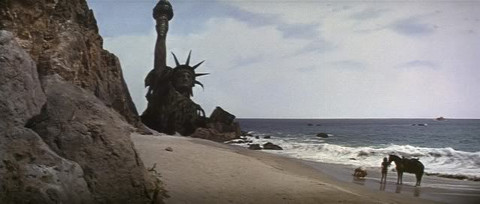
Dodge is killed and Landon rendered unconscious, while George, his throaty injury rendering him mute, is taken to the local Ape City, where we meet the important characters of psychologist Zira and her medical student fiancee Cornelius. Seeing as George doesn’t seem to possess much of the stuff, these two ironically fill the function of providing an equivalent of humanity. Their dynamic is terrific, with Zira trying hard to convince the sceptical Cornelius that the established stories about the rise of apes might be wrong. Cornelius wants to believe her, but his own status as an archeologist has been questioned by the scientific community for just these kinds of ideas. What’s so amazing is how well the acting of Kim Hunter and Roddy McDowall comes through. The ape masks may not convince any more, but one can still appreciate how mobile they are and how they allow the expressions and even emotions of the actors playing them to shine through. They soon befriend George, but every other ape seems to hate him, especially Dr. Zaius who refuses to believe that this human could be any different from the others, though he seems to know more than he lets on, the character having a really good arc where you end up actually understanding his actions, seeing as he basically wants to prevent the downfall of the ape society. Even if he’s clearly symbolising religion in a film which pits it against science [which comes in the form of Cornelius and Zaius] and prefers the latter, it’s hard not to sympathise with his view of humans as destructive and evil. Humans once virtually destroyed their own civilisation and could be perfectly capable of doing the same to that of the apes.
As for George, he does spend a lot of time caged or being questioned, though I’m sure that Heston relished the chance to be topless so often and does get a lengthy escape sequence where he runs all over the place knocking gorillas around despite his supposedly weakened state. But really it’s the chat that dominates, though you don’t notice this much as the film still moves very well, even in the final act where a series of clues eventually lead to the Big Revelation. Indeed what’s so weird to me about the ending is that it’s known as being this huge surprise, and was indeed a surprise to me that first time, yet the fact that this ape planet is Earth becomes likely ten or so minutes before; six years ago my wife guessed it when they found that doll! The progression is still very good and the final image a really powerful one, with George falling to his knees and then being seen from a distance where it looks like he’s worshiping this huge deity. What does niggle is that George fails to question the fact that, despite being on an alien planet, its apes happen to speak English, though granted, this is a familiar device and it doesn’t undermine matters as we are both shocked and slightly amused to be in this theocratic society, where the apes consider the primitive humans as vermin to be hunted and either killed outright, enslaved, or used in scientific experiments. I think that today the fact that the blond, cultured orangutans are the nobles, the dark-haired, mildly nervous chimpanzees are the scientists; and the dark-skinned, incompetent gorillas are the police might be questioned, but I reckon this racial aspect was clearly intended to seem uncomfortable. After all, this ape civilisation these apes have created has many of the worse aspects that human civilisation can have.
George has a love interest called Nova, and perhaps for the first time actually begins to care for someone. Heston, not a great actor but one who did project a kind of grandeur which made him ideal to play all those famous historical characters and this one, has rarely been more emotional, delivering with perfect weariness his character’s most important lines, “Imagine me needing someone. Back on Earth I never did. Oh, there were women. Lots of women. Lots of love-making but no love. You see, that was the kind of world we’d made. So I left, because there was no one to hold me there.” The script contains several other lines that have become iconic even if many don’t know what they’re from, and even a few easy crowd pleasing chuckles like, “Human see, human do” and “I never met an ape I didn’t like”. George even tells a young, rebellious, teenage chimpanzee not to trust anyone over thirty. These bits maybe seem a bit too on the nose and some were actually made up late in the day by an extra uncredited writer or improvised on the spot, but at the end of the day Planet Of The Apes was designed mostly to entertain despite its philosophical and allegorical aspects. It even feels able to give us some mild jolts here and there, like the revelation of what the apes have done to Landon. Then there’s Jerry Goldsmith’s stunning music which he actually conducted in an ape mask. Scored for orchestra and an enormous percussion section consisting of anything he could lay his hands on, it’s a strikingly avant garde work, oozing primal power though perhaps not an easy listen away from the film with its lack of proper themes or even tonality. Planet Of The Apes does a lot of things such as putting a mirror in front of us, making us think about the treatment of animals, warning us about the destructiveness of us humans, yet never forgets that its primary function is to be a good yarn. For me, it’s the bitter ironic nature of its central character’s journey that always sticks in my mind in my mind, a character who hates his fellow humans, tries to get away from them – and then has his hatred entirely justified at the end.





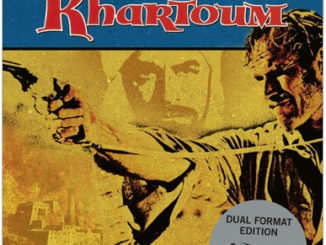
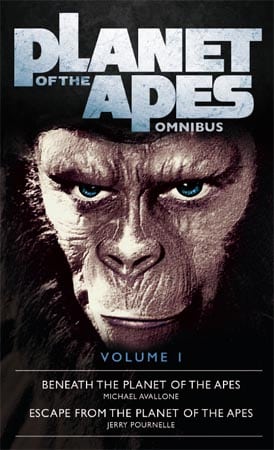
Be the first to comment